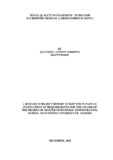| dc.description.abstract | Total Quality Management uses the competitive and know-how of all personnel as well as arithmetical problem resolving and projecting approaches of numerical method and mechanism. (Summers, 2000). Medical laboratories are accredited to ISO/IEC 15189: 2012, to ensure impartiality and competence. In Kenya, medical laboratory services spread across private, individual specialists, donor funded, faith-based and public health facilities. There are a total of 32 Accredited Medical laboratories in Kenya as per the published data on the websites of accreditation bodies at the time of the study. The objective of the study was to determine TQM practices adopted by ISO 15189 accredited medical laboratories in Kenya and factors influencing these laboratories in adopting the same. The factors that affect these principles of TQM were determined. These factors were measured against TQM practices adopted by ISO 15189 accredited laboratories. A descriptive cross-sectional survey design considered the entire populations of 32 accredited medical laboratories in Kenya with 100 questionnaires sent out. 23 accredited laboratories returned a total of 70 questionnaires which were used for data analysis and deduction of findings. Factor analysis was used to cross tabulate the factors and how they influence the TQM adoptions within the accredited Medical Laboratories in Kenya. The 8 factors identified to have played a great role in ISO accreditation included teamwork, environment, organizational structure, training, communication, QMS documentation and leadership in that order. TQM practices adopted by ISO accredited medical laboratories in Kenya included systems-based approach, factual decision making, process approaches, management commitment, employee involvement and training, continuous improvement, and factual-based decisions. These practices, according to respondents, had a positive effect on the quality and competitiveness of the medical laboratories. The findings pointed out that TQM practices should be fully adopted to ensure attainment of competitive advantage; client satisfaction and positive public perception in the decision making of the said laboratories. Based on the findings the laboratories are recommended to adopt teamwork, continuous training, effective communication strategies and transformative leadership to ensure satisfactory services are offered to clients. Limitation involved biasness that could have arisen by respondents favoring their laboratories to be offering effective and quality services. | en_US |



